|
Home
Up

Marcom Award
2007-2008-2009
2010-2011-2012
2013-2014

Videographer Award
2007-2008-2009
2010-2013-2015

AVA Award Winner
2007-2008-2009
2010-2011-2012
2013-2014-2015

2008-2009-2010
2011-2012-2013
2014
Hermes Creative
Award Winner

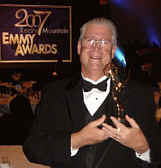
Ed
Sharpe / CouryGraph Productions
Glendale Daily Planet / KKAT-IPTV 2007 EMMY®Award Winner
2007
Rocky Mountain Region Emmy® Award Winner for Breaking News/ Continuing
Coverage
FIRST
IN GLENDALE!

Berkeley Film Festival
Grand Festival
Pioneer In
Television Award
2011

Remi Award Winner
Worldfest Houston
2009 - 2010 -2011

2009 EMPixx Awards

Telly Awards 2006-2007-2008-2009-2010

2008 & 2009
Communicator Awards
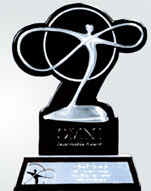
Omni Intermedia Awards
2007-2008-2009

Millennum Awards
2006-2007-2008

Marcom Award
2007-2008-2009
2010-2011-2012
2013-2014
 
W3 Media Awards
2008/2009
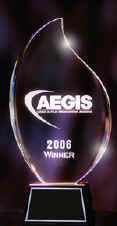
2007/2008/2009 Aegis
Finalists and Winners

Accolade Award Winner
2007-2008-20010

Arizona Assn. of Black Journalists Diversity Winner
2008/2009

Arizona Press Club Winner
Ed Sharpe,
The Glendale Daily Planet:
Use of Online Media
"Cesar E. Chavez 2007"
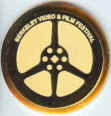
Berekeley Film Festival
2006-2007-2008-
2009-2010-2012

Media Achievement Awards

2008/09 Finalists and Winners - DV Awards

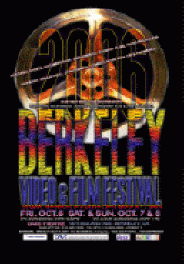
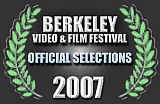

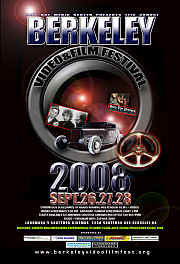

CouryGraph
Productions



CALIFORNIA
HISTORICAL RADIO SOCIETY
IS PLEASED TO HONOR
EDWARD
A. SHARPE
WITH THE
CHARLES D. 'DOC' HERROLD
AWARD FOR
OUTSTANDING ACHIEVEMENT IN
THE PRESERVATION AND DOCUMENTATION OF
EARLY RADIO.
BY
THE BOARD OF DIRECTORS, 1992:


| |
|
Cesar E. Chavez 2007
|
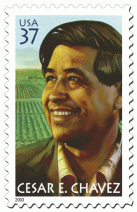 Happy Birthday Cesar E. Chavez!
Happy Birthday Cesar E. Chavez!
Chavez is best
known as the founder of the United Farm Workers of America, AFL-CIO
(UFW). He was a tireless advocate for nonviolent social change, and
dedicated his life to working in service of others. Sen. Robert F.
Kennedy called Chavez "one of the heroic figures of our
time."
A second-generation American, Chavez was born on March 31, 1927,
near his family's farm in Yuma, Ariz. At age 10, his family became
migrant farm workers after losing their farm in the Great
Depression. Throughout his youth and into his adulthood, Chavez
migrated across the Southwest laboring in the fields and vineyards,
where he was exposed to the hardships and injustices of farm worker
life.
After achieving only an eighth-grade education, Chavez left school
to work in the fields full-time to support his family. He attended
more than 30 elementary and middle schools. Although his formal
education ended then, he possessed an insatiable intellectual
curiosity, and was self-taught in many fields and well read
throughout his life.
Chavez joined the U.S. Navy in 1946 and served in the Western
Pacific in the aftermath of World War II.
Chavez's life as a community organizer began in 1952 when he joined
the Community Service Organization (CSO), a prominent Latino civil
rights group. While with the CSO, Chavez coordinated voter
registration drives and conducted campaigns against racial and
economic discrimination primarily in urban areas. In the late 1950s
and early 1960s, Chavez served as CSO's national director.
In 1962 Chavez resigned from the CSO to establish the National Farm
Workers Association, which later became the United Farm Workers of
America.
For more then three decades Chavez led the first successful farm
workers union in American history, achieving dignity, respect, fair
wages, medical coverage, pension benefits and humane living
conditions as well as countless other rights and protections for
hundreds of thousands of farm workers. His union's efforts brought
about the passage of the groundbreaking 1975 California Agricultural
Labor Relations Act to protect farm workers. Today, it remains the
only law in the nation that protects the right of farm workers to
unionize.
Chavez passed away on April 23, 1993, in San Luis, Ariz.
The stamp image was painted by freelance illustrator Robert
Rodriguez and features a portrait of Chavez against a background of
empty grape fields. Rodriguez based the portrait on a 1976
photograph of Chavez taken by Bob Fitch and provided to the Postal
Service by the Cesar E. Chavez Foundation in Los Angeles, Calif.
Rodriguez based the background on an aerial photograph taken in the
1960s by Ted Streshinsky. (USPS)
|
Info from Stamp Release #02-072 USPS
|
|
Glendale Chamber
Foundation's fourth annual
Cesar E. Chavez Breakfast Celebrating Diversity
Raised $5000
Glendale AZ- GDP-Ed Sharpe> The
Glendale Chamber Foundation's fourth-annual Cesar Chavez Breakfast kicked
off at 7:30 a.m. Friday March, 30 at the Glendale Civic Center ballroom. The
breakfastwas open to the public.

The Glendale Chamber
Foundation raised
$5,000 Dollars to
contribute to the
Cesar Chavez Foundation.
|
|
|
|
Glendale Chamber Foundation's fourth annual
Cesar E. Chavez Breakfast Celebrating Diversity
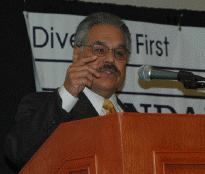
Luis
Valdez Presented Cesar Chavez Day Keynote Address At Glendale
Arizona Civic Center
Longtime
friend of Chavez's continues dream to assist others
Luis Valdez related to when he first
pitched the idea of El Teatro Campesino to farm-worker
champion Cesar Chavez, who replied there was no money to fund it!
Valdez didn't let that stop him.
Valdez was born in Delano, California, in
1940 in a migrant labor camp. Chavez's family moved in nearby a year
later. Valdez experienced firsthand the harsh life of migrant farm
laborers.
During the famous 1965 Grape Strike
strike in California, Valdez had joined Chávez in his efforts to
organize the farm workers of Delano. It was there that Valdez
brought together farm workers and students to found El Teatro
Campesino (the Workers' Theater). Chavez's activism inspired Valdez
to go ahead with the theater group, which still operates today at
the historic Mission San Juan Bautista in California.
Valdez refers to his start up theater
effort "I learned how to create something out of nothing,"
Valdez continues "The man created a movement out of
nothing."
Valdez related when he started out there were many ethnic
groups working in the fields in California, Blacks, Mexicans,
people from Oklahoma
He credits Chavez for inspiring him, changing his life
providing focus. Luis continues to live and spread Chavez's vision
through his lectures, theatre and life.
Valdez poised the question to the audience:
"To whom does the future belong?"
WATCH
THE VIDEO GET THE ANSWER!
Watch
a video of Luis Valdez's keynote address!
My
written words are nothing compared to hearing the man speak!
Luis Valdez - life, theater
and film highlights
- Valdez was born in 1940 in Delano,
California, into a family of migrant farm workers.
- At the age of six he began to
work in the fields with his parents and nine brothers and
sisters.
- Valdez finished high school and to
attend San Jose State College majoring in English and explored his
interest in theater.
- While in college he won a
writing contest for his play, The Theft. Later, the college's
drama department produced The Shrunken Head of Pancho Villa,
his play about the problems facing a Mexican couple in America.
- After graduating from college in
1964, Valdez joined the San Francisco Mime Troupe and during this time
he learned the techniques of agitprop (agitation and propaganda)
theater, in which a play puts forth political views and tries to spur
the audience to act on those views.
- For years migrant farm workers had
to endure unhealthy working conditions. They worked long hours for
extremely low wages and received no benefits. Finally, in 1965,
migrant grape pickers in Delano decided to go on strike. These workers
were backed by the labor leader César Chávez and the migrant worker
union he helped found, the National Farm Workers Association.
- After the strike began, Valdez joined
Chávez in his efforts to organize the farm workers of Delano. It was
there that Valdez brought together farm workers and students to found
El Teatro Campesino (the Workers' Theater).
- In 1967 Valdez and El Teatro
Campesino left the vineyards and lettuce fields to create a theater
for the entire Mexican American nation. The movement evolved into teatro
chicano, an agitprop theater that blended traditional theatrical
styles with Mexican humor, character types, folklore, and popular
culture.
- Across America, Mexican American
theatrical groups sprang up to stage Valdez's one-act plays, called
actos. The actos explored modern issues facing Mexican Americans: the
farm workers' struggle for unionization, the Vietnam War, the drive
for bilingual education, the war against drug addiction and crime, and
community control of parks and schools.
- In 1971 Valdez published a collection
of actos to be used by Mexican American community and student theater
groups.
- In 1978 Valdez broke into mainstream
theater with a Los Angeles production of his popular play Zoot
Suit, about Mexican-American gang members during the Los Angeles
race riots of 1942-43. It was then made into a film in 1982
- Valdez's play Corridos
was the dramatization of a series of Mexican folk ballads, won the
praise of theater critics. It was then made into a television
production that aired on PBS in the fall of 1987.
- La Bamba - Entertainment, A
History Lesson and A Biography - We all took notice...
Valdez's breakthrough into mainstream
America, was La Bamba, the screen biography of Ritchie Valens, the
1950s Mexican American rock-and-roll singer. Through this movie
America learned not only about the tragically short life of Valens but
also about the lifestyle and other elements of the Mexican American
community. The movie was an overwhelming box office success and
brought Valdez's writing and directing talents to be noticed by
a nation who grew up hearing the popular song La Bamba.
Valdez holds honorary
doctorates from San Jose State University, the University of Santa Clara,
Columbia College of Chicago, and the California Institute of the Arts. He
is also a founding faculty member of the new California State University
Monterey Bay and a founding member of the California Arts Council. His
awards include the George Peabody Award (1987), the Governor's Award
(1990), and Mexico's prestigious Aguila Azteca Award (1994).
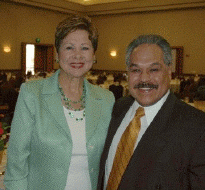 Glendale
Mayor Elaine Scruggs with Luis Valdez, founder of El
Teatro Campesino pose for a photo following yesterdays gala breakfast
where Luis was the keynote
speaker (Photo- Ed Sharpe Glendale Daily Planet) Glendale
Mayor Elaine Scruggs with Luis Valdez, founder of El
Teatro Campesino pose for a photo following yesterdays gala breakfast
where Luis was the keynote
speaker (Photo- Ed Sharpe Glendale Daily Planet)
Luis Valdez
Luis Valdez (born 1940) was founder of the El
Teatro Campesino in California and is considered to be the father of
Mexican American theater.
Mexican Americans must be seen as a
nation with roots spreading back to the ancient Aztec...
Watch
a video of Luis Valdez's keynote address!
|
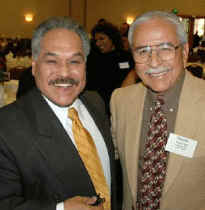
Director/Productor Luis
Valdez and Councilmember Manny Martenez |
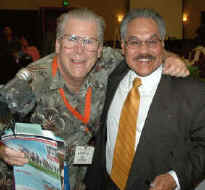
Ed Sharpe and Luis Valdez
KKAT-IPTV / Glendale Daily Planet
|
Many shots from the
event!
Pick photo up
here! Click to get it larger, mouse right click on large
photo and then select 'save picture as'
Other media please contact us for use and credit information that should
go with the photo.
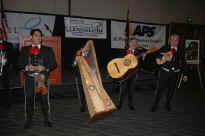 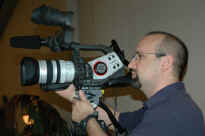 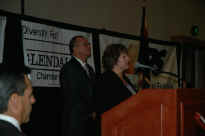 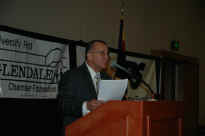 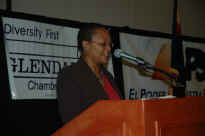  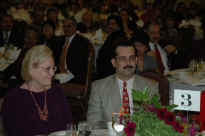 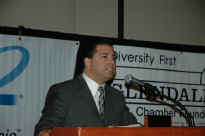 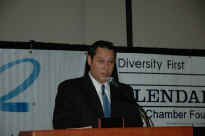  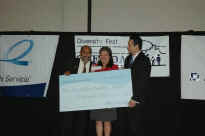 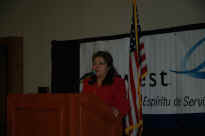 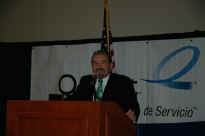 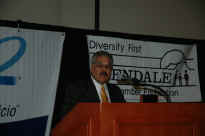 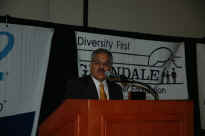 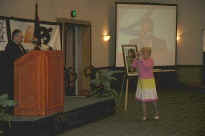 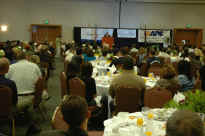 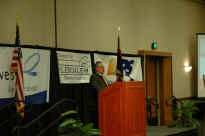 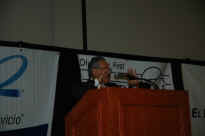 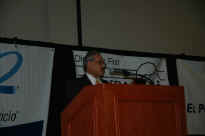 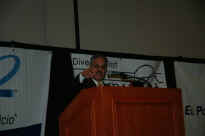 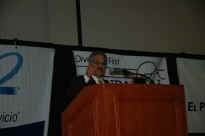 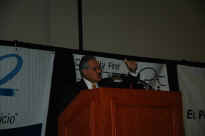 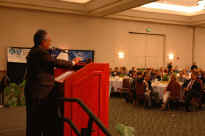 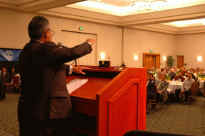 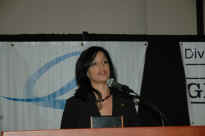 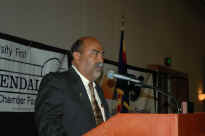 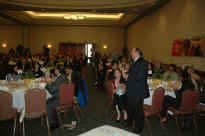 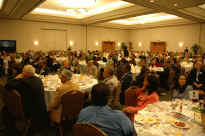  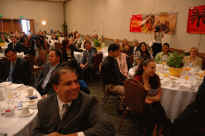 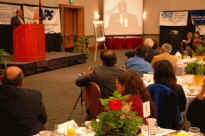 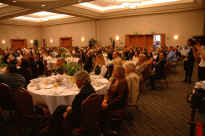 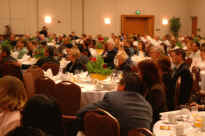  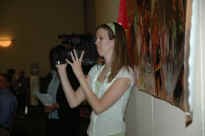 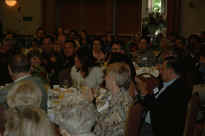 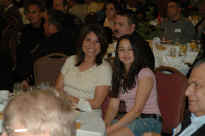 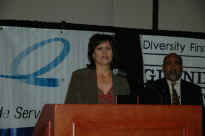 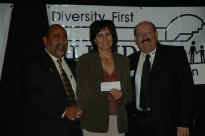 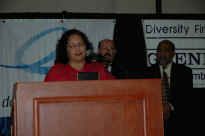 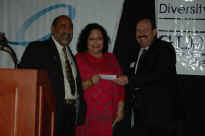 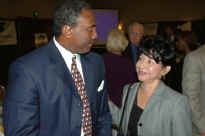 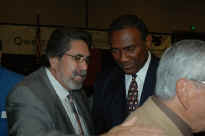 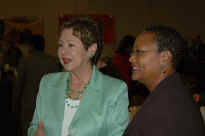 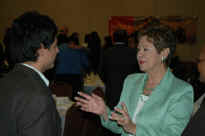  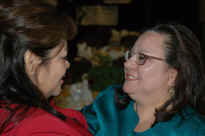 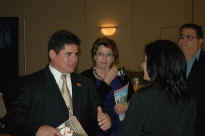 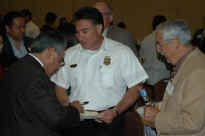 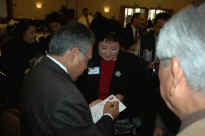 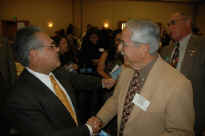 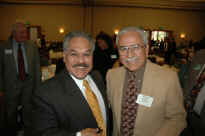 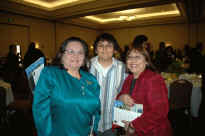 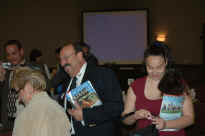 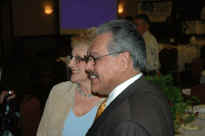 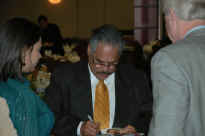 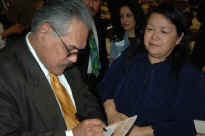 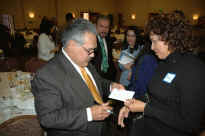 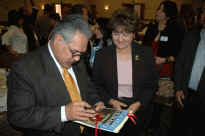 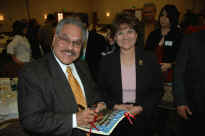 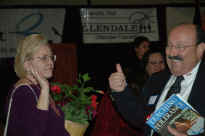 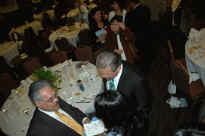 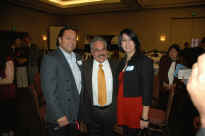 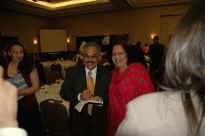  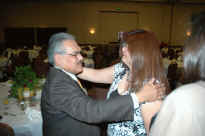 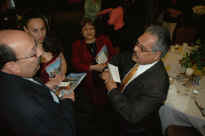 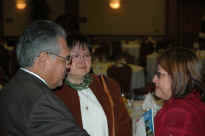 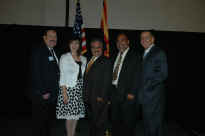 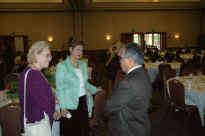 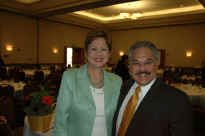
|
|
|
 TAKE
THE CESAR CESAR CHAVEZ TRIVIA QUIZ! TAKE
THE CESAR CESAR CHAVEZ TRIVIA QUIZ!
http://www.colapublib.org/chavez/facts_quiz.htm
Other great links on
Cesar Chavez from the Los Angles Library
César
E. Chávez Home Page |
César
E. Chávez Community Service Week |
Community
and Library Events
Honoring César E.
Chávez |
Share
Your Memories of César Chávez |
Story
of the UFW Flag
Reading Lists
|
César E. Chávez
Web Links |
Prayer
of the Farm Worker's Struggle
César E.
Chávez Chronology | Some Facts About César E. Chávez |
César
E. Chávez Curriculum
|
|

































 Happy Birthday Cesar E. Chavez!
Happy Birthday Cesar E. Chavez!



